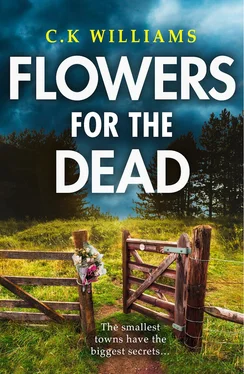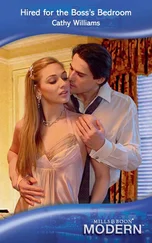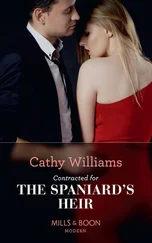On the corner of Foster Lane, I kill the engine, peek out of the windshield. That must be Miss Luca’s house. Kaitlin was right: it’s very nice. All white, three storeys, a slate shingle roof. Green hedges growing all around it, a metal gate in front of the white gravel driveway.
Go on, ring her doorbell.
But all I do is keep sitting in the car. My limbs are heavy.
Come on. Get up. She might be able to tell you something.
I try and move my legs, but they won’t budge.
Move. Raise your arm.
Slowly, I raise my eyes. Look into the rear mirror and focus on the tip of my nose. Then I breathe.
I am raising my hand to open the door. I am raising my hand to open the door. I am raising my hand to open the door …
My hand is moving, inching towards the door handle. I use the momentum to go all the way and push the door open. Mrs Dündar taught me that trick, Teo’s mum, when I was a child. Teo called it magic. That made her laugh. We all thought it was magic when we were kids.
I get out of the car. Autosuggestion it’s called, I know that now. An easy trick. That’s how I managed to open the door to the delivery man the night the Kenzies’ parcel was delivered. That’s how I manage most of my life. Oliver thinks it is stupid. Says I don’t need hocus-pocus like that. I think it reminds him too much of how far gone I am sometimes.
Slowly I make my way towards Miss Luca’s house. The gate isn’t locked, opening almost silently. The gravel crunches under my feet as I walk up to her door. Check the name on the bell. LUCA. I’m in the right place then.
Nervously, I lift my hand. Ring the bell.
Then I wait. I can hear nothing moving inside. Maybe she’s out in the garden. It’s Sunday, but really a little cold to be out. I ring again.
When nobody opens up, I return to the car to tear a piece of paper out of my notebook. Before I can change my mind, I scrawl my name on it, tell her I’m back at the house and ask her to get in touch if she wants to. I almost leave her my phone number, but then remember that there is no reception at our house. Never has been. I remember getting my first phone and how I always had to go into the village to do anything with it. Reception is fine in Northallerton and Kendal, and even here on the High Street my phone works well enough, and on the tarmac road into town. Maybe it’s the hollow. Maybe that gives them trouble. The Dales are difficult to tame, Mrs Mason always used to say.
God, how long I haven’t thought about Mrs Mason. About Jacob. Jay was what we called him. How long I haven’t thought about the peaks, Bolton Castle after dark, Cobblestone Snicket and how we say snicket instead of alley and flayed instead of scared.
I still haven’t thought about where it was that my parents fell.
I drop the note into her postbox, watching it slot in place next to an issue of Psychology Today . Then I get back into the car. When I sit down in the driver’s seat, I feel like I’ve run five miles. But I’m also proud. I made a start.
Turning the car around, I glance at my list. Jacob Mason is next.
On my way to his house I stop at the supermarket. Considering that the shop still looks the very same on the outside, it comes as a surprise that they’ve changed practically everything on the inside. It’s impossible to find anything. The products are different, too. Did they sell avocados back then? I don’t remember. All I remember is going shopping with Mum, and how large I thought the trolleys were, and meeting Mr Dündar in aisle 7, bent down very low to pick up the raisins he was looking for. ‘These are the good ones,’ he used to say, and give me a few straight from the package, right in the aisle. Mum was scandalised. The cashiers never minded, I don’t think. I don’t know. Mum always pulled me on after the barest bit of small talk. Whenever I turned back to look at Mr Dündar as a child, I saw him watch us leave, his expression inexplicably sad.
After a few confused rounds through the aisles, I finally manage to get a sense of the place. In aisle 6, I run into Mr Wargrave, who was already old when I was born and now uses a walking frame but seems all right otherwise. Only when he greets me with a friendly ‘Hullo, Martha dearest,’ do I realise he might not be holding up as well as I thought.
‘Hello, Mr Wargrave,’ I say. ‘How are you?’
‘All right, aye. Getting a paper. The obituaries,’ he says, pointing shakily at the local newspaper sitting on his walking frame. His nails have turned yellow. They are splintering at the edges. Then he grins at me. He’s got new teeth, I think. ‘It’s always good to see you’re outliving all them bastards, isn’t it?’
I smile, not sure what to say to that. ‘Mason,’ he goes on. ‘She’s still going strong. Nursing home now. Good for her, though, with that son of hers.’
I furrow my brow. ‘What do you mean?’ I ask him. Jay adored his mother.
But Mr Wargrave only waggles his eyebrows, grown far too long, just like the hairs sprouting out of his nose. ‘I’m not in a home yet. All alone at my place. Neighbours are gone, too. No one to listen in on us. You remember that, Martha.’
Well, that was a disturbing experience. As quickly as possible, I go to one of the self-checkouts, grabbing a prepaid SIM card as I pass. I will be needing it. I don’t think I’ll be able to bear seeing all of Oliver’s messages and not respond. For the first time, I’m almost grateful there isn’t any signal down in the hollow.
Once all the groceries are in the boot, I steer the car towards the High Street and put the Dresden Dolls back on. ‘Coin-Operated Boy’. Sing, under my breath, watching the houses I drive past, looking for the Masons’. There’s an uneasy sensation at the bottom of my stomach. He is just a toy, but I turn him on and he comes to life, automatic joy …
What did Mr Wargrave mean when he talked about Jacob like that? I remember the way Anvi and Kaitlin talked about him, too. The tone of their voices, far too disapproving for the boy I remember: Bright eyes, well-spoken, well-mannered. Entitled, maybe, but good at heart. He’d wanted to be an artist, or a graphic designer at least. While we went out, and when we were friends, too, he would make me little drawings and pass them to me in class. Of flowers, instead of giving me bouquets. Of chocolates, to tease me. Of myself, when he was feeling particularly brave. I was the only one he showed his sketchbook to.
The uncomfortable feeling at the pit of my stomach intensifies as I get closer to where his house should be. He was my friend. The first person I fell in love with. You don’t forget your first crush. I haven’t seen him in nineteen years, and even at seventeen, we’d been split up for a while. Goodness, we’d been so young when we got together, we didn’t even have sex. Even though we did do all sorts of other things. He wasn’t exactly shy about what he wanted, and neither was I. We weren’t in a healthy place, so we thought the more bruising it involved the better. I still remember how he’d sneered at me when I broke up with him, sneered and insulted me to hide how hurt he was, a teenager about to lose everything but unable to stop it.
Driving down the High Street has memories batting into me on every corner. About the first time that Anna, Teo, Jay and I tricked the goody machine, spilling sweets into our laps like a miniature version of Willy Wonka’s chocolate factory. The first time the three us scratched our names into a bench, Anna and Teo and I, in the small park by the graveyard. The first place I rode a bicycle, in the parking lot just behind the town sign, with Jay teaching me, already carrying around his box of crayons wherever he went, painting broad colourful patterns onto the pavement along the High Street and into their front garden.
Читать дальше











